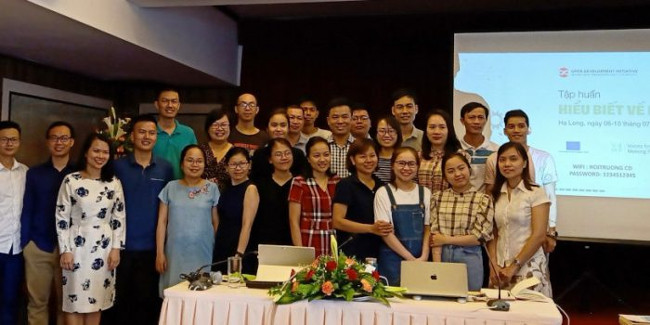As the UN Biodiversity Conference (COP 16.2) convened last week…

Data Literacy Training
The first training in a series of training courses on data literacy is organized by PanNature in collaboration with Open Data Institute (ODI) in Ha Long, Quang Ninh province from July 6 to 10.
Data literacy is the ability to read, understand, work with, analyze, and argue with data. It is also the ability to derive meaningful information from data. Data literacy is not simply the ability to read the text since it requires quantitative and analytical skills (for example: mathematical and statistical) involving reading and understanding data.
Hence, with increased data literacy, one will be able to produce more insightful and evidence-based stories, thereby enabling researchers, policymakers, and journalists to effectively communicate with the public.
ODI in collaboration with People and Nature Reconciliation organize a series of Training on Data Literacy that consists of three training. Each training is a 5-day workshop that will progressively equip participants with skills and knowledge on data literacy and data-driven storytelling.
The training curriculum has been localized from the World Bank’s Data Literacy Program, allowing learners to comprehensively practice and apply knowledge gained during the workshops into their group projects on forestry sector data. At the same time, the training program introduces many open, free, and up-to-date software platforms for processing and illustrating data, such as OpenRefine, Table, Data wrapper, Flourish, and Piktochart.
The training series consists of 6 following modules:
Module 1: From Evidence to Stories
This component introduces data and how participants could use it to create forest stories. It will also explain what open data is and how it affects policy at the national level. Through the analysis of many case studies, participants will explore how data from various sectors have been used to create data-driven stories.
Module 2: Finding Data, Data Collection & Data Formats
This component introduces basic knowledge of data formats, the skills to find data online, sample tools that are used for collecting data, and the concepts to transform data into stories. Starting with a review of data formats, the unit moves on to techniques used to find, convert and process data that is in different formats, and how to develop a hypothesis and questions for a data story. Selected open-source tools will be introduced to participants in case they require tools supporting their data collection, such as Mapeo – Mobile (only available in Android at the moment).
Module 3: Understanding Data
This component will introduce basic concepts of data organization and cleaning as well as questions to help participants evaluate the source of the data. It will also cover basic calculations and an introduction to statistics. The ethics and potential pitfalls of working with data will also be covered.
Module 4: Data Visualization
This component will introduce the basics of effective communication with data visualization, focusing on best practices in visually communicating data, emphasizing techniques and tools that could be used to convey knowledge and information through visual stories, not just dry statistics. Participants will be trained in a handful of data visualization software including Datawrapper and Tableau.
Module 5: Thinking Like a Data Journalist
Using all the data skills learned in the previous modules, participants will be divided into groups based on their interests and will dive into the relevant datasets to produce stories by using these datasets. Participants will be throughout guided by the expert in this process.
Module 6: Digital Rights and Data Security
Working with data in the digital age raises concerns about the privacy and rights of data owners. Key online security practices will be recommended when using technologies, including smartphones, computers, datasets, and the Internet in their daily activities. Participants will learn about threat modeling, risk assessment, and how to ensure data security.
Due to the COVID-19 pandemic, ODI’s regional experts are not able to go to Vietnam so the training program is implemented in both online and offline formats with the participation of nearly 30 members from different organizations nationwide.
The training program is organized under the EU-funded Voices for Mekong Forests (V4MF) project.
Some pictures of the first training:






